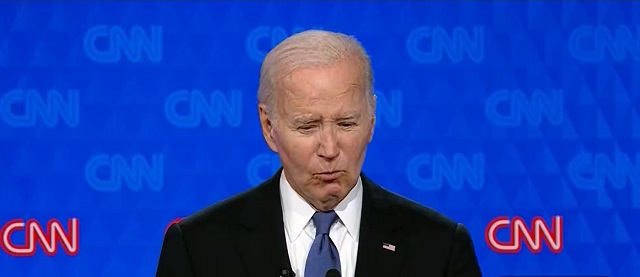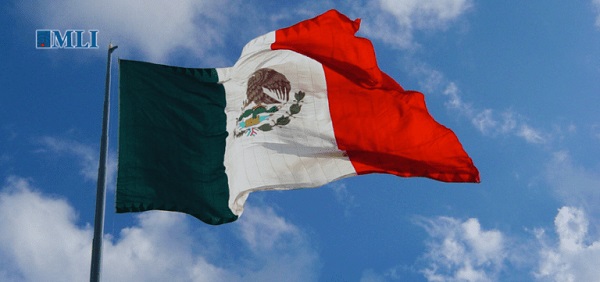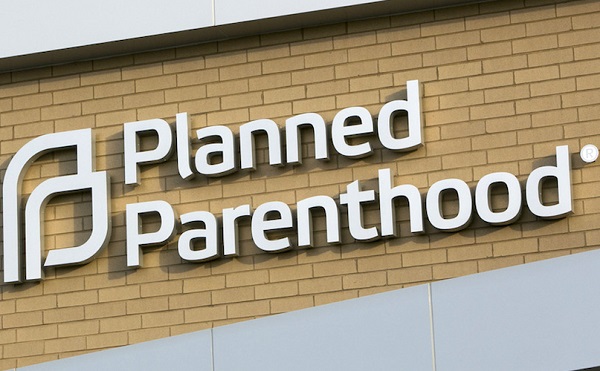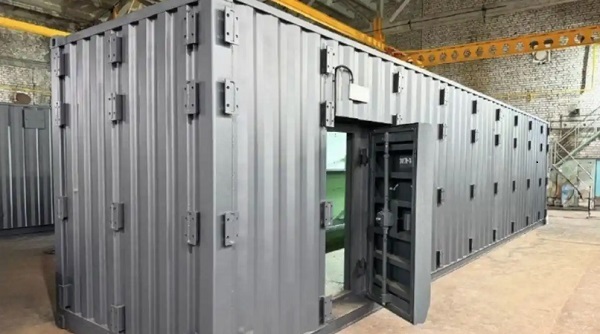International
Dem Megadonors Wanted To Hold Intervention, Convince Biden To Step Down After Debate Implosion

 From the Daily Caller News Foundation
From the Daily Caller News Foundation
By WILL KESSLER
Democratic megadonors discussed holding an intervention to convince President Joe Biden to step down as the party’s nominee after Thursday night’s poor debate performance, The New York Times reported Saturday.
Many have criticized Biden’s performance at the first presidential debate against former President Donald Trump as poor, with the president appearing to freeze at several points, was often hard to understand and made multiple verbal gaffes. Following the dismal performance, some major Democratic donors spoke of setting up an intervention for the president to convince him to step down from the race, while others hoped Biden would decide to exit on his own after seeing the widespread negative reaction, according to the NYT.
“He deserves the opportunity to reflect and say: ‘I still think I can do this. I still think I am the best choice,’” Democratic donor and friend of the president, Stephen Cozen, told the NYT about what he said to other donors calling for an intervention. “That’s his decision. And I will stick with him until he makes it.”
Ron Conway and Laurene Powell Jobs, members of a group of Silicon Valley megadonors, were racing to talk to other donors about what they described as a “possible catastrophe” after the debate, according to the NYT. A possible solution the donors came up with was finding a way to contact First Lady Jill Biden to convince the president to step down from the ticket.
Dems' Favorite Fundraising Platform Enabling Donations To Nonprofit Linked To Palestinian Terror Org https://t.co/JR2I7E8zi9
— Daily Caller (@DailyCaller) June 29, 2024
One of those Silicon Valley donors canceled plans to host a fundraiser featuring Biden later this summer, according to the NYT. Despite the concern of losing momentum in receiving donations, the Biden campaign claimed that they had raised $14 million from online sources following the debate into Friday morning.
Biden’s campaign has been struggling to fundraise at the same rate as the Trump campaign over the past few months, despite starting with a $100 million advantage, according to the NYT. The Biden campaign and the Democratic National Committee had $212 million at the start of June, while the Trump campaign and the Republican National Committee had $235 million.
Among the donors critical of the president following the debate, there was talk about which figure could possibly convince the president to step aside, such as former President Barack Obama, Nancy Pelosi or Chuck Schumer, according to the NYT. The donors also speculated who could possibly replace the president as the nominee, with Michigan Gov. Gretchen Whitmer and California Gov. Gavin Newsom among the options.
Despite being a front-runner as a possible replacement for Biden, Newsom has made repeated statements expressing his support for the president and pledging not to run in the 2024 presidential election.
Biden’s mental acuity has long been questioned by opponents, due in part to being the oldest president in American history, with a second term taking him well into his 80s. Several prominent Democrats who previously defended Biden’s mental acuity were notably quiet following the debate after seeing the president’s performance.
An investigation into Biden’s handling of classified documents by special counsel Robert Hur concluded that the president shouldn’t be charged because he appeared as “a sympathetic, well-meaning, elderly man with a poor memory.”
The Biden campaign did not immediately respond to a request to comment from the Daily Caller News Foundation.
Crime
Mexican cartels are a direct threat to Canada’s public safety, and the future of North American trade

From the Macdonald Laurier Institute
By Gary J. Hale for Inside Policy
RCMP raided a fentanyl ‘superlab’ in Falkland, BC, with ties to a transnational criminal network that spans from Mexico to China.
On October 31, residents of Falkland, BC, were readying their children for a night of Halloween fun. Little did they know that their “quaint, quiet, and low-key little village” was about to make national headlines for all the wrong reasons.
On that day, RCMP announced that it had raided a fentanyl “superlab” of scary proportions near Falkland – one that police called the “largest and most sophisticated” drug operation in Canada. Officers seized nearly half-a-billion-dollars’ worth of illicit materials, including 54 kilograms of finished fentanyl, 390 kilograms of methamphetamine, 35 kilograms of cocaine, 15 kilograms of MDMA, and six kilograms of cannabis” as well as AR-15-style guns, silencers, small explosive devices, body armour, and vast amounts of ammunition.
They also found massive quantities of “precursor chemicals” used to make the drugs. This strongly suggests that the superlab was tied into a transnational criminal network that spans from Mexico to China – one that uses North America’s transportation supply chains to spread its poisonous cargo across Canada and the United States.
The Canada-US-Mexico relationship is comprised of many interests, but the economic benefits of trade between the nations is one of the driving forces that keep these neighbours profitably engaged. The CUSMA trade agreement is the successor to NAFTA and is the strongest example globally of a successful economic co-operation treaty. It benefits all three signatories. This level of interdependence under CUSMA requires all parties to recognize their respective vulnerabilities and attempt to mitigate any threats, risks, or dangers to trade and to the overall relationship. What happens to one affects all the others.
The supply chain, and the transport infrastructure that supports it, affects the balance books of all three. While the supply chain is robust and currently experiences only occasional delays, the different types of transport that make up the supply chain – such as trucks, trains, and sea-going vessels – are extremely vulnerable to disruption or stoppages because of the unchecked violence and crime attributed to the activities of Mexican Transnational Criminal Organizations (TCOs). These cartels operate throughout Mexico, from the Pacific ports to the northern plains at the US-Mexico border.
The sophistication of the Falkland superlab strongly suggests connectivity to multi-national production, transportation, and distribution networks that likely include China (supply of raw products) and Mexico (clandestine laboratory expertise).
For most Canadians, Mexican cartels call to mind the stereotypical villains of TV and movie police dramas. But their power and influence is very real – as is the threat they pose to all three CUSMA nations.
Mexico’s cartels: a deadly and growing threat
Mexican cartels started as drug trafficking organizations (DTOs) in the 1960s. By the late 1990s they had evolved to become transnational enterprises as they expanded their business beyond locally produced drugs (originally marijuana and heroin) to include primarily Colombian cocaine that they transported through Mexico en route to the US and Canada.
Marijuana and the opium poppy are cultivated in Mexico and, in the case of weed, taken to market in raw form. While the cartels required some chemicals sourced from outside Mexico to extract opium from the poppy and convert it into heroin, the large-scale, multi-ton production of synthetic drugs like Methamphetamine and today Fentanyl expanded the demand for sources of precursor chemicals (where the chemical is slightly altered at the molecular level to become the drug) and essential chemicals (chemicals used to extract, process, or clean the drugs.)
The need to acquire cocaine and chemicals internationalized the cartels. Mexican TCO’s now operate on every continent. That presence involves all the critical stages of the criminal business cycle: production, transportation, distribution, and re-capitalization. Some of the money from drug proceeds flow south from Canada and the US back to Mexico to be retained as profits, while other funds are used to keep the enterprise well-funded and operational.
In Mexico, the scope of their activities is economy-wide; they now operate many lines of criminal business. Some directly affect Mexico’s economic security, such as petroleum theft, intellectual property theft (mainly pirated DVDs and CDs), adulterating drinking alcohol, and exploiting public utilities. Others are in “traditional” criminal markets, such as prostitution, extortion, kidnapping, weapons smuggling, migrant smuggling and human trafficking. Organized auto theft has also become another revenue stream.
Criminal Actors
The Cartel de Sinaloa (CDS or Sinaloa Cartel) and the Cartel Jalisco Nueva Generacion (CJNG) are the two principal TCO’s vying for territorial control of Mexico’s air, land, and maritime ports, as well as illegal crossing points. These points on the cartel map are known as “plazas,” and are often between formal ports of entry into the US. By controlling territories crucial for the inbound and outbound movement of drugs, precursors, people, and illegal proceeds, the cartels secretly transport illicit goods and people through commercial supply chains, thus subjecting the transportation segment of legitimate North American trade to the most risk.
That is giving the cartels the power to impair – and even control – the movement of Mexico’s legitimate trade. While largely kept out of the public domain, incidents of forced payment of criminal taxation fees, called “cuotas,” and other similar threats to international business operations are already occurring. For instance, cuotas are being imposed on the transnational business of exporting used cars from the US to Mexico. They’re also being forced on Mexican avocado and lime exporters before the cartels will allow their products to cross the border to the US and international markets. This has crippled that particular trade. Unfortunately, the Mexican government has been slow to react, and the extortion persists throughout Mexico. It is worth repeating – these entirely legitimate goods reach the market only after cartel conditions are met and bribes paid.
The free trade and soft border policies of the US of recent years have allowed cartel operatives to enter that country and work the drug trade with limited consequence. In May, the U.S. Drug Enforcement Administration (DEA) published the National Drug Threat Assessment 2024, where it reported that the Jalisco and Sinaloa cartels operate in all 50 US states and are engaged in armed violence in American cities as they fight for market shares of the sales of Methamphetamine, Fentanyl, and other drugs sourced from Mexico.
The DEA’s findings should sound alarms in Canada. Canada and the US have similar trade and immigration policies, which allow the Mexican cartels to easily enter and control the wholesale component of the drug trade. The long-term effects of the drug trade are the billions of dollars gained that allow for the corruption of government officials. Canada should be on guard: Mexican drug cartels in Canada could begin to not only kill ordinary Canadians by knowingly selling them deadly drugs like Fentanyl – their operatives can also embed themselves in Canadian society, as they have in the US, leading to ordinary citizens on Canadian streets being victimized by the armed violence cartels regularly use to assert their position and power.
Organized crime and Mexican governance
Canada faces these threats directly, but the indirect ones that the cartels present to Mexican governance are no less consequential to Canada in the long term – and likely sooner. Illicit agreements between corrupt Mexican government officials and the cartels assure that the crime organizations retain control of territory and have freedom to operate.
That threat is becoming increasingly existential. Cartel fighters are well disciplined, well equipped and strong enough to challenge Mexico’s military, currently the government’s main tool to fight them. Should the TCOs come to dominate Mexican society or gain decisive influence over government policy, Mexico’s government risks being declared a narco-democracy and the US may come to see the cartels as a threat to national security. That in turn could lead to a US military intervention in Mexico – not an outcome desired by either side.
While that scenario may be considered extreme, it is not as far from reality as many may think. While in many respects the US-Mexico trading relationship remains unchanged, the overall political context has become testy – and could be a real flashpoint for the incoming Trump administration.
Political developments in Mexico have played a role. After his election in 2018, former Mexican President Andrés Manuel López Obrador (commonly referred to his initials, AMLO) demonstrated a disdain for all things North American. This included frequent complaints of US interference or violation of Mexican sovereignty – complaints that were more about keeping Mexican government domestic actions out of the public eye. To retain a shroud of secrecy over government corruption, Mexico under Amlo started in 2022 to limit the activities and numbers of US federal law enforcement agencies operating there, particularly the FBI, DEA, ATF and ICE. These agencies formerly enjoyed a close relationship with the Mexican Federal Police – a force AMLO disbanded and replaced with the National Guard. The AMLO administration reduced the number of US assets and agents in Mexico, particularly singling out the DEA for the most punitive restrictions.
During his administration, AMLO placed the army and navy in charge of all ports of entry and gave them responsibility for all domestic public safety and security by subordinating the Guardia Nacional (GN), or National Guard, to the army. The GN, the only federal law enforcement agency, has been taken over by military officials who are sometimes corrupt and in league with the cartels.
Mexican President Claudia Sheinbaum, who took office in 2024, has continued AMLO’s organizational moves. Sheinbaum comes from the same political party and has so far extended carte blanche to the military, whose administration is opaque and now operates with impunity, under the guise of “national security” and “sovereignty” concerns.
It is expected that Sheinbaum will continue to shield American eyes from Mexico law enforcement and judicial affairs. The fear in the US law enforcement and national security community is that Sheinbaum may even declare DEA non grata, much as then Venezuelan President Hugo Chavez in 2005 and Bolivian President Evo Morales in 2008 did in their countries. Both were anti-American leftists of the same mindset as AMLO and Sheinbaum, who feared detection of their connections to the illegal drug trade.
Sheinbaum has publicly demonstrated disinterest in the consistent application of the rule of law against the TCOs by stating that she will continue the “hugs not bullets” (“abrazos, no balazos”) non-confrontational, non-interventional posture towards organized crime. Agreements with corrupt government officials will allow the cartels to expand their business and to operate with impunity. Through intimidation, bribery, and murder, the cartels affect decision making at the municipal, state, and federal levels of Mexican government. That leverage, while performed outside the public eye, has the potential to negatively affect supply and demand among the three countries at the very least, and at worst, to signal that cartels in Mexico are directly or indirectly involved in the formulation of government security, immigration, drug, and trade policy.
AMLO enacted constitutional changes that will provide Sheinbaum with the powers of a dictator, giving her administration unchecked control of the executive, legislative, and judicial branches of government. As a result, the judiciary in Mexico is in crisis mode with 8 of 11 Supreme Court Justices resigning in October 2024 to protest the unconstitutional disregard for due process that started with AMLO and continues with Sheinbaum thanks to a “voting for judges” law that she and AMLO have rammed into operation without debate. This development portends even more corruption.
Without the existence of an independent judicial system, these institutional changes could give pause to US and Canadian negotiators when it comes time to renew CUSMA in 2026.
Beyond 2025: Mexican organized crime as a threat to the US and Canada, and Greater North American implications
Most worrying, the cartels will be in a yet stronger position to affect and even dictate the pace and volume of legitimate trade between the US and Mexico under Sheinbaum. This makes Mexico the weakest link among the three CUSMA members.
The US and Canada should therefore be concerned about the strength and power of the cartels because the current trajectory could provide them a greater role in Mexico’s performance as a trade partner. Should this trend continue, the US would likely begin to see Mexico through the lens of a threat to critical components of its national security: 1) the public safety of US citizens being killed in epidemic proportions by the drugs produced by citizens of Mexico; 2) the negative impact or increased cost of commerce that supplies goods to the American market; and 3) the CUSMA relationship that sustains the economic strength of all three participating countries.
This worrisome evolution requires proactivity by Canada and the US to insist that Sheinbaum reverse the gains that the cartels have made to influence policy and erode the government’s monopoly on territorial control and the use of violence, and reverse Mexico’s limits on drug enforcement co-operation with what should be its partners to the north. Pressure should also be applied to demand a return to a drug policy model that includes international law enforcement co-operation and a continuation towards the transformation of the Mexican judicial system from a mixed inquisitorial or accusatorial system to an adversarial system that employs the use of juries, witness testimony, oral hearings and trials, and cross-examination of witnesses, as opposed to a system where cartel-influenced elections could dictate judicial outcomes.
The implications of the further development of a Mexico narco-democracy for US-Mexico-Canada relations would be devastating. Co-operation on public safety and security would cease completely, allowing the cartels to take full control of commercial supply lines, significantly reducing trade between the three nations – likely causing the CUSMA trade deal to fracture until governance returned to duly elected civilian officials.
Continental security and Canada’s contribution
The continued success of CUSMA lies with Mexico more than any other country. Should Mexico continue on its path to autocracy, it could upset the trade deal, crucial to the prosperity of all three countries. Canada is not immune from what on the surface may appear to be mostly bilateral, US-Mexico issues, because, regardless of the commodity – whether it’s consumables or manufactured items – the cartels are positioned and empowered to affect imports, exports, trade, and migration throughout North America.
For the foreseeable future, Mexico is not going to voluntarily change its security posture. This enables the cartels to remain persistent threats, especially to trade. Canada and the US need to continue to jointly insist that Mexico take a stronger stance against organized crime and that it take steps to strengthen the judiciary and the rule of law in that country.
Gary J. Hale served 31 years in the Drug Enforcement Administration (DEA), retiring as an executive-level intelligence analyst. In 2010, he was appointed as Drug Policy fellow and Mexico Studies Scholar at the James A. Baker III Institute for Public Policy at Rice University in Houston, Texas.
Business
Trump’s government efficiency department plans to cut $500 Billion in unauthorized expenditures, including funding for Planned Parenthood

From LifeSiteNews
Elon Musk and Vivek Ramaswamy shared their plans to ‘take aim’ at ‘500 billion plus’ in federal expenses, including ‘nearly $300 million’ to ‘progressive groups like Planned Parenthood.’
Elon Musk and Vivek Ramaswamy are planning to ax taxpayer funding for Planned Parenthood as part of their forthcoming work for the next Trump administration, they revealed in a Wednesday op-ed in The Wall Street Journal.
The businessmen have been appointed by President Donald Trump to lead a new Department of Government Efficiency (DOGE), which will work from outside the official government structure to cut wasteful government spending and excess regulations, as well as “restructure federal agencies,” as Trump announced last week on Truth Social.
Musk and Ramaswamy shared Wednesday that as part of their work at DOGE to downsize government spending, they will be “taking aim at the $500 billion plus in annual federal expenditures that are unauthorized by Congress or being used in ways that Congress never intended,” thereby “delivering cost savings for taxpayers.”
They specifically called out Planned Parenthood as one institution that will lose taxpayer funding once DOGE kicks into gear. In their op-ed, the duo said the federal expenditures they plan on cutting includes the “nearly $300 million” dedicated “to progressive groups like Planned Parenthood.”
Musk and Ramaswamy also reportedly will take aim at the “$535 million a year to the Corporation for Public Broadcasting and $1.5 billion for grants to international organizations,” according to Catholic Vote, although they have not shared all of the federal spending they plan to cut or reduce.
“With a decisive electoral mandate and a 6-3 conservative majority on the Supreme Court, DOGE has a historic opportunity for structural reductions in the federal government,” the business duo wrote. “We are prepared for the onslaught from entrenched interests in Washington. We expect to prevail.”
Mogul and X owner Musk, who was outspoken before his DOGE appointment about the big problem of waste, noted last week that if the government is not made efficient, the country will go “bankrupt.”
He reposted a clip from a recent talk he gave in which he explained that not only is our defense budget “pretty gigantic” — a trillion dollars —but the interest the U.S. now owes on its debt is higher than this.
“This is not sustainable. That’s why we need the Department of Government Efficiency,” Musk said.
-

 ESG2 days ago
ESG2 days agoCan’t afford Rent? Groceries for your kids? Trudeau says suck it up and pay the tax!
-

 John Stossel2 days ago
John Stossel2 days agoGreen Energy Needs Minerals, Yet America Blocks New Mines
-

 Daily Caller2 days ago
Daily Caller2 days agoLos Angeles Passes ‘Sanctuary City’ Ordinance In Wake Of Trump’s Deportation Plan
-

 Alberta2 days ago
Alberta2 days agoProvince considering new Red Deer River reservoir east of Red Deer
-

 Addictions2 days ago
Addictions2 days agoBC Addictions Expert Questions Ties Between Safer Supply Advocates and For-Profit Companies
-

 Aristotle Foundation1 day ago
Aristotle Foundation1 day agoToronto cancels history, again: The irony and injustice of renaming Yonge-Dundas Square to Sankofa Square
-

 Business16 hours ago
Business16 hours agoCBC’s business model is trapped in a very dark place
-

 conflict2 days ago
conflict2 days agoPutin Launches Mass-Production of Nuclear Shelters for his People





